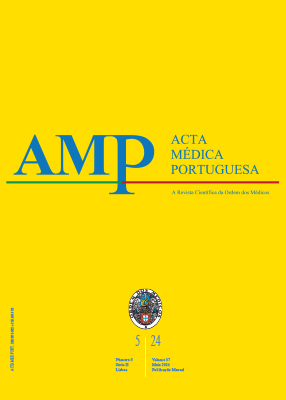The Importance of Play
DOI:
https://doi.org/10.20344/amp.20641Keywords:
Child, Child Development, Play and PlaythingsAbstract
N/a.
Downloads
References
Fundo das Nações Unidas para a Infância. Convenção sobre os direitos da criança e protocolos facultativos. 2019;1-80. [consultado 2023 nov 08]. Disponível em: https://www.unicef.pt/docs/pdf_publicacoes/convencao_direitos_crianca2004.pdf.
Yogman M, Garner A, Hutchinson J, Hirsh-Pasek K, Golinkoff RM, Committee on Psychosocial Aspects of Child and Family Health, Council on Communications and Media. The power of play: a pediatric role in enhancing development in young children. Pediatrics. 2018;142:e20182058.
Burriss KG, Tsao LL. Review of research: how much do we know about the importance of play in child development? Child Educ. 2002;78:230-3.
Hansen J, Macarini SM, Martins GD, Wanderlind FH, Vieira ML. O brincar e suas implicações para o desenvolvimento infantil a partir da psicologia evolucionista. J Hum Growth Dev. 2007;17:133-43.
Kang S. The power of play. Am J Health Promot. 2020;34:573-5.
National Institute for Play. Play: the basics. 2018. [consultado 2023 nov 08]. Disponível em: https://www.nifplay.org/what-is-play/the-basics/.
Nijhof SL, Vinkers CH, van Geelen SM, Duijff SN, Achterberg EJ, van der Net J, et al. Healthy play, better coping: the importance of play for the development of children in health and disease. Neurosci Biobehav Rev. 2018;95:421-9.
Ginsburg KR, American Academy of Pediatrics Committee on Communications, American Academy of Pediatrics Committee on Psychosocial Aspects of Child and Family Health. The importance of play in promoting healthy child development and maintaining strong parent-child bonds. Pediatrics. 2007;119:182-91.
Hinkley T, Brown H, Carson V, Teychenne M. Cross sectional associations of screen time and outdoor play with social skills in preschool children. PLoS One. 2018;13:e0193700.
Perasso G, Camurati G, Morrin E, Dill C, Dolidze K, Clegg T, et al. Five reasons why pediatric settings should integrate the play specialist and five issues in practice. Front Psychol. 2021;12:687292.
Downloads
Published
How to Cite
Issue
Section
License
Copyright (c) 2024 Acta Médica Portuguesa

This work is licensed under a Creative Commons Attribution-NonCommercial 4.0 International License.
All the articles published in the AMP are open access and comply with the requirements of funding agencies or academic institutions. The AMP is governed by the terms of the Creative Commons ‘Attribution – Non-Commercial Use - (CC-BY-NC)’ license, regarding the use by third parties.
It is the author’s responsibility to obtain approval for the reproduction of figures, tables, etc. from other publications.
Upon acceptance of an article for publication, the authors will be asked to complete the ICMJE “Copyright Liability and Copyright Sharing Statement “(http://www.actamedicaportuguesa.com/info/AMP-NormasPublicacao.pdf) and the “Declaration of Potential Conflicts of Interest” (http:// www.icmje.org/conflicts-of-interest). An e-mail will be sent to the corresponding author to acknowledge receipt of the manuscript.
After publication, the authors are authorised to make their articles available in repositories of their institutions of origin, as long as they always mention where they were published and according to the Creative Commons license.









